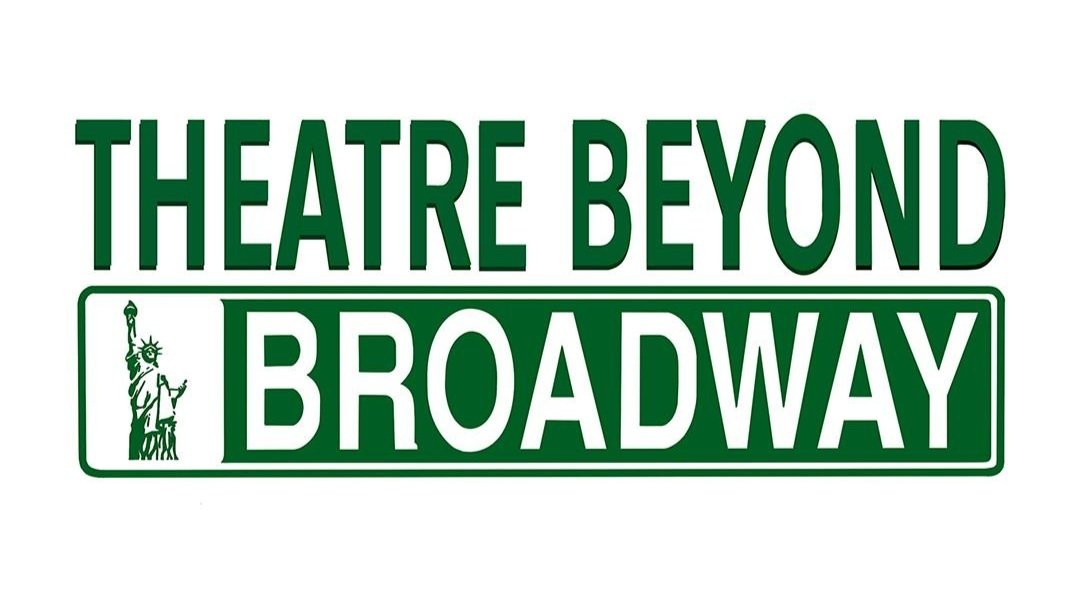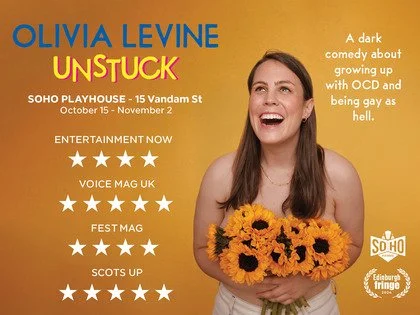olivia levine: Unstuck
Written and performed by Olivia Levine; Directed by Molly Rose Heller
Soho Playhouse | 15 Vandam Street, New York, NY 10013
October 15 - November 2, 2025
Olivia Levine’s Unstuck begins not with the bombast of a typical comedy hour, but with the strange serenity of a séance. There she stands — in the pool of a single spotlight — clutching a counterfeit candle and an orange, as though invoking both citrus and spirit. From this dual offering emerges the tone of the evening: half ritual, half bit, a conjuring of laughter laced with dread. “I hope my parents are always happy and that they live forever — of course they will, but just in case,” Levine chants, before the incantation collapses into a muttered, “Done done done done done GUN — goddammit.” The audience titters, uncertain whether to laugh or to cross themselves. And therein lies Levine’s genius: she draws you in with humor, then traps you inside the anxious machinery of obsessive-compulsive disorder — where panic dresses itself as precision, and repetition becomes both prayer and punchline.
Obsessive-Compulsive Disorder — so often reduced to a punchline or a quirk of cleanliness — is, in truth, a tyrant of the psyche. It is a chronic and consuming affliction that colonizes the mind, dictating what one sees, fears, and believes about oneself and others. It weaponizes the very things its host cherishes most, locking them in a perpetual loop of vigilance and self-doubt. Imagine staring at the world through a magnifying glass that burns rather than illuminates — that is the private inferno of OCD.
In Unstuck, Levine confronts this inferno with both surgical precision and theatrical abandon. What begins as an autobiographical confessional evolves into something closer to ritual — a reclamation of agency from the disorder that once defined her. She tells her story not with the sanitized detachment of a patient but with the daring immediacy of a performer unafraid to turn her own psyche inside out. The result is an experience that oscillates between hilarity and horror, between show and séance.
Under the deft and discerning direction of Molly Rose Heller, Unstuck unfolds with the fleet-footed pace of stand-up yet the intimate gravity of confession. The show hums with a kinetic rhythm — brisk, candid, conversational — yet each beat carries the tremor of something sacred. Levine moves through her material not merely as a comedian, but as a kind of secular priestess of revelation, guiding her congregation through laughter toward discomfort, and then, somehow, grace. With the sly confidence of someone utterly at home in contradiction, Levine tosses oranges into the audience — a gesture at once playful and liturgical — like a mischievous priest distributing communion with a wink. “That’s so rude of me — does anyone else want one?” she chides herself, folding humility into humor. The laughter that follows is not the polite ripple of amusement but the sudden, unguarded outburst that comes when an audience senses it is in capable hands — the laughter of trust.
And then, with the same breezy authority, she detonates the sacred and the profane in a single, crystalline line: “My mother’s vagina. I popped out looking like an advertisement for kid’s Klonopin.” It’s not shock for shock’s sake — Levine is far too deliberate for that. Rather, it lands with the precision of a confession and the timing of a virtuoso: the sort of moment when truth, comedy, and transgression meet in perfect, explosive harmony.
Levine, with her mischievous grin and conspiratorial warmth, invites us into her chaos as though offering us high tea at the edge of a cliff. We laugh — sometimes helplessly, sometimes nervously — because her timing is impeccable, her candor disarming. Yet beneath every punchline lies the pulse of terror: the sense that control, once lost, might never be recovered. It is that tension — the coexistence of comedy and calamity — that animates Unstuck and prevents it from collapsing into mere catharsis.
In Unstuck, the raw Levine does not merely undress for her audience; she performs a kind of psychic autopsy. She peels back not only her defenses but her very skin, metaphorically cracking open her ribs to reveal the tangled, beating machinery within. Her compulsions — her rituals, her repetitions, her erotic fixations, her desperate attempts to control the uncontrollable — are presented not as pathology but as poetry. It is cringe-inducing at times, yes, but always in the service of something more than spectacle. What could so easily devolve into trauma voyeurism instead becomes communion — because Levine’s secret weapon is her charm.
That charm — luminous, unpretentious, and wholly human — prevents Unstuck from becoming a “traumalogue,” that dreaded hybrid of therapy session and stage play. Levine possesses the rare comic alchemy of making you laugh at what should terrify you, of turning self-loathing into rhythm. She invites you to look at her most shameful compulsions, and in doing so, you find yourself looking at your own. It is a priceless gift — the kind that only the most self-aware performers can offer. Levine does not perform at us but with us, and that is her true art: to make spectators co-conspirators in her liberation.
Her openness extends to every realm of her life — from the sexual to the existential. She speaks of her early awareness of queerness, of her obsession with masturbation, of her fixation on preventing her parents from dying — each confession another layer stripped away. In sharing these, she does not seek absolution; she seeks understanding. Levine leads her audience unflinchingly into the underbelly of her psyche, guiding us through the deepest recesses of her private terrors with a candor so startling it borders on the sacred. She does not merely flirt with taboo — she dismantles it. With the composure of a performer who has long since made peace with her own discomfort, she speaks of the unspeakable: the delusion that she had somehow impregnated her own mother; the disquieting dream of intimacy involving her father and stepmother; the conviction, half comic and half catastrophic, that she possessed a “killer vagina.”
These revelations, jarring as they are, never feel gratuitous. They are confessions refracted through the prism of performance — moments in which the grotesque becomes, almost perversely, luminous. Between these eruptions of memory, Levine engages in verbal sparring with her own disembodied voice — an aural manifestation of her inner censor — debating what she can and cannot, should and should not, permit herself to recall. The exchanges are at once funny and harrowing, as if we are witnessing a mind wrestling itself into coherence before our very eyes. And by the end of the show, she finds it — not in herself alone, but in the audience’s laughter, recognition, and love.
Unstuck concludes precisely as it began — poised delicately between confession and exorcism, laughter and lament. In its final tableau, Levine reenters the glow of her own invention, lifting the ersatz candle once more — a prop so knowingly false it becomes, paradoxically, an emblem of truth. Its plastic flame trembles in the darkness, a flicker of manufactured sincerity that somehow feels utterly real. And then, in a voice at once childlike and weary, she murmurs, “I hope you all really, really like me.” It is a moment that hovers, suspended — tender, self-mocking, and almost unbearably human. The lights dim, but the residue of that plea remains in the air like incense. Unstuck refuses the comfort of catharsis or the illusion of completion. There is no triumphal arc, no promise of cure. Instead, Levine leaves us in the exquisite disorder of existence — that fragile equilibrium between neurosis and desire, between shame and delight, between the need to control and the need to be seen.
What emerges is less a performance than a reckoning: a raw, ecstatic invitation to inhabit the mess of being alive. Levine’s gift lies not merely in her audacity, but in her precision — in her ability to sculpt chaos into comedy without sanding down its edges. You laugh until the laughter turns inward, until you recognize yourself in the contours of her anxiety. Levine’s neuroses, like her comedy, do not merely expose her; they implicate us all. In the end, Unstuck is a paradox made flesh — filthy yet pure, fearless yet tender, chaotic yet curiously cleansing. It leaves you unsettled, amused, and oddly absolved.
Review by Tony Marinelli.
Published by Theatre Beyond Broadway on October 30, 2025. All rights reserved.



